
Yay our #LongCovid paper is online!!!
medrxiv.org/content/10.110…
While we had a few thousand more fill in the survey, this paper focuses on 3,762 #longhaulers (sick >28 days) who got sick between Dec-May (to look at an average of ~6 months of data).
Some key findings:
1/
medrxiv.org/content/10.110…
While we had a few thousand more fill in the survey, this paper focuses on 3,762 #longhaulers (sick >28 days) who got sick between Dec-May (to look at an average of ~6 months of data).
Some key findings:
1/
We looked at 205 symptoms over 10 organs systems (Neuropsychiatric, Pulmonary, Head Ears Eyes Nose Throat (HEENT), Gastrointestinal, Cardiovascular, Musculoskeletal, Immunologic, Dermatologic, Reproductive/Genitourinary/Endocrine).
On average, 9 in 10 of these were affected!
2/
On average, 9 in 10 of these were affected!
2/
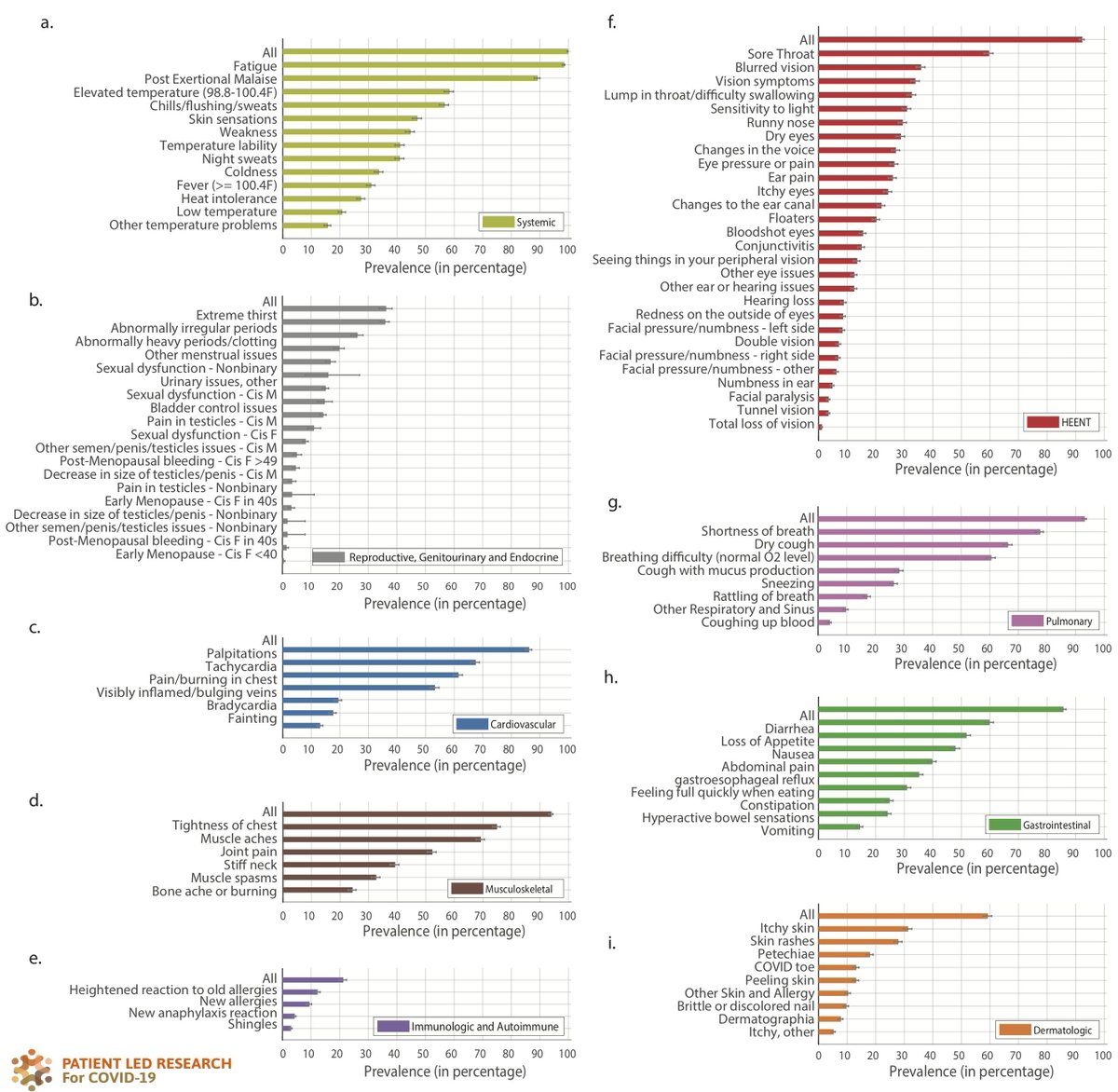
Of the 205 symptoms, we looked at 74 over time, looking at Weeks 1-4 and Months 2-7.
These graphs show the % of respondents who have reached each month who have these symptoms. Some of them go down (fever*, dry cough) while others don't. (*tho some have fever for months!) 3/
These graphs show the % of respondents who have reached each month who have these symptoms. Some of them go down (fever*, dry cough) while others don't. (*tho some have fever for months!) 3/
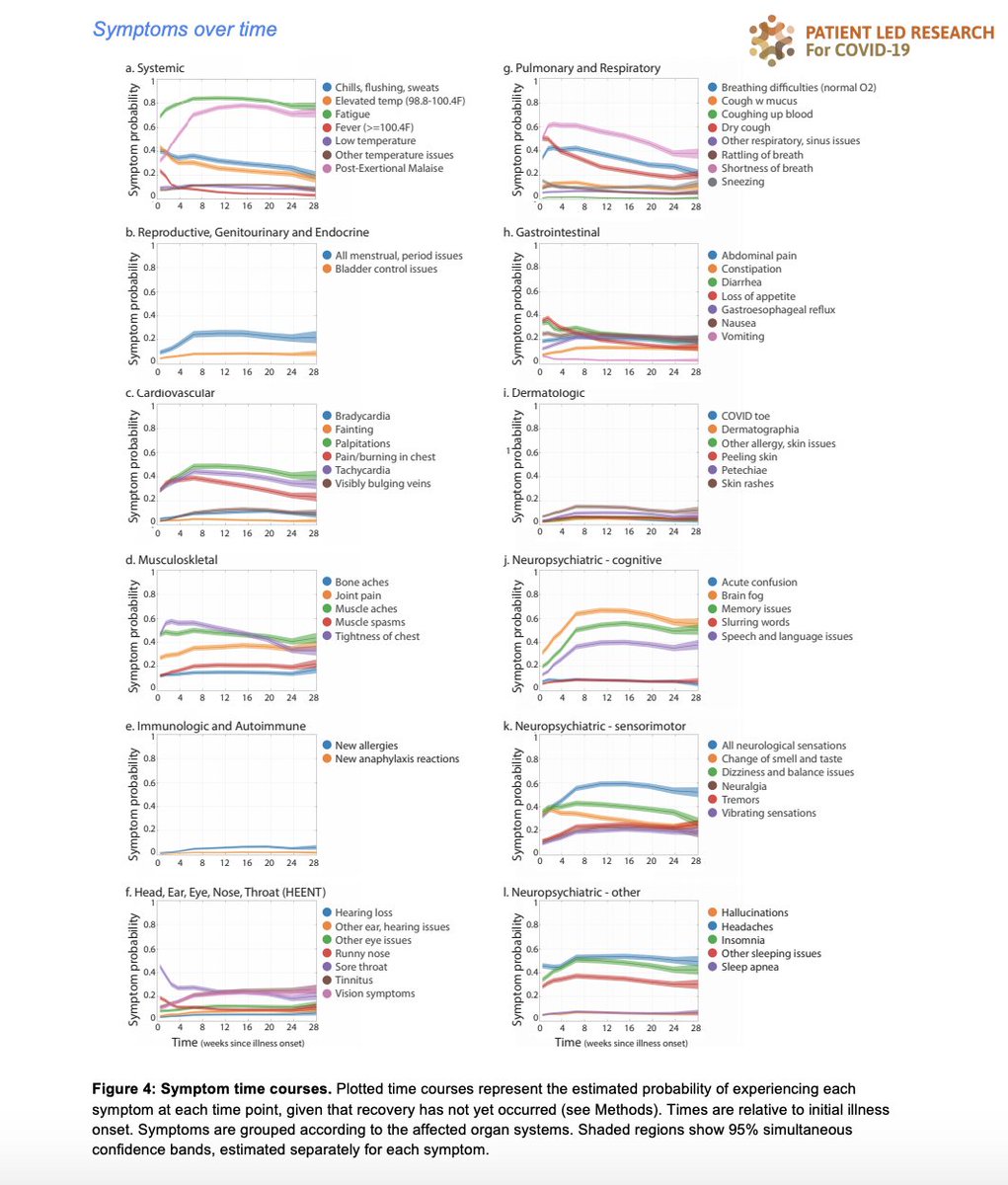
(Personal interpretation) there are a few symptoms that seem to increase or happen in later months (months 6+) that more research/investigation is worth looking into: bone ache/burning, tinnitus, hearing loss, and other ear symptoms, and possibly eye/vision symptoms. 4/
A very cool graph showing the average *onset* of these #LongCovid symptoms. 5/ 
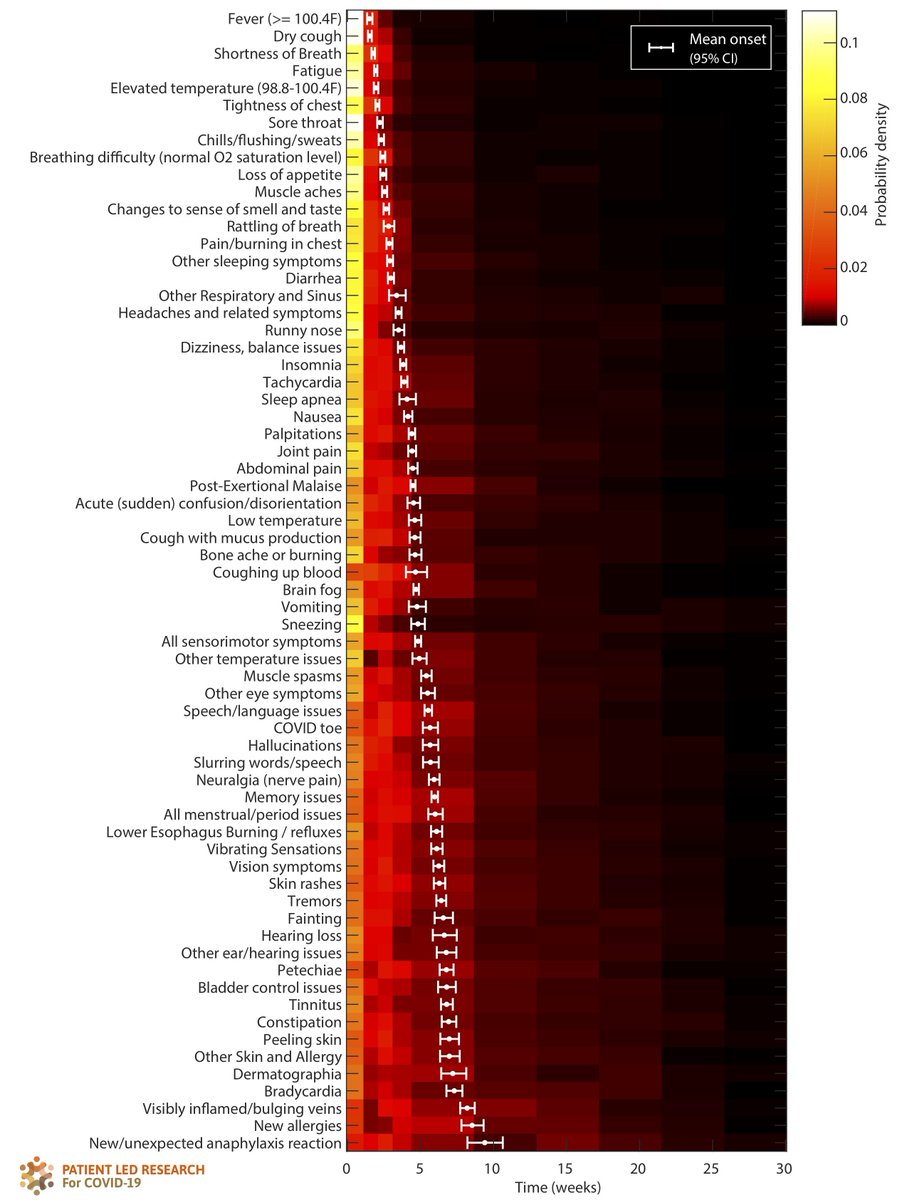
~Half of our symptoms were Neuropsychiatric, so we divided them into 9 subgroups. Most of these were common: Cognitive dysfunction (85%), Sensorimotor issues (tremors, tingling, skin burning) (~91%), Sleep issues (79%), Headaches (77%).
Memory loss happened to 73%.
6/
Memory loss happened to 73%.
6/
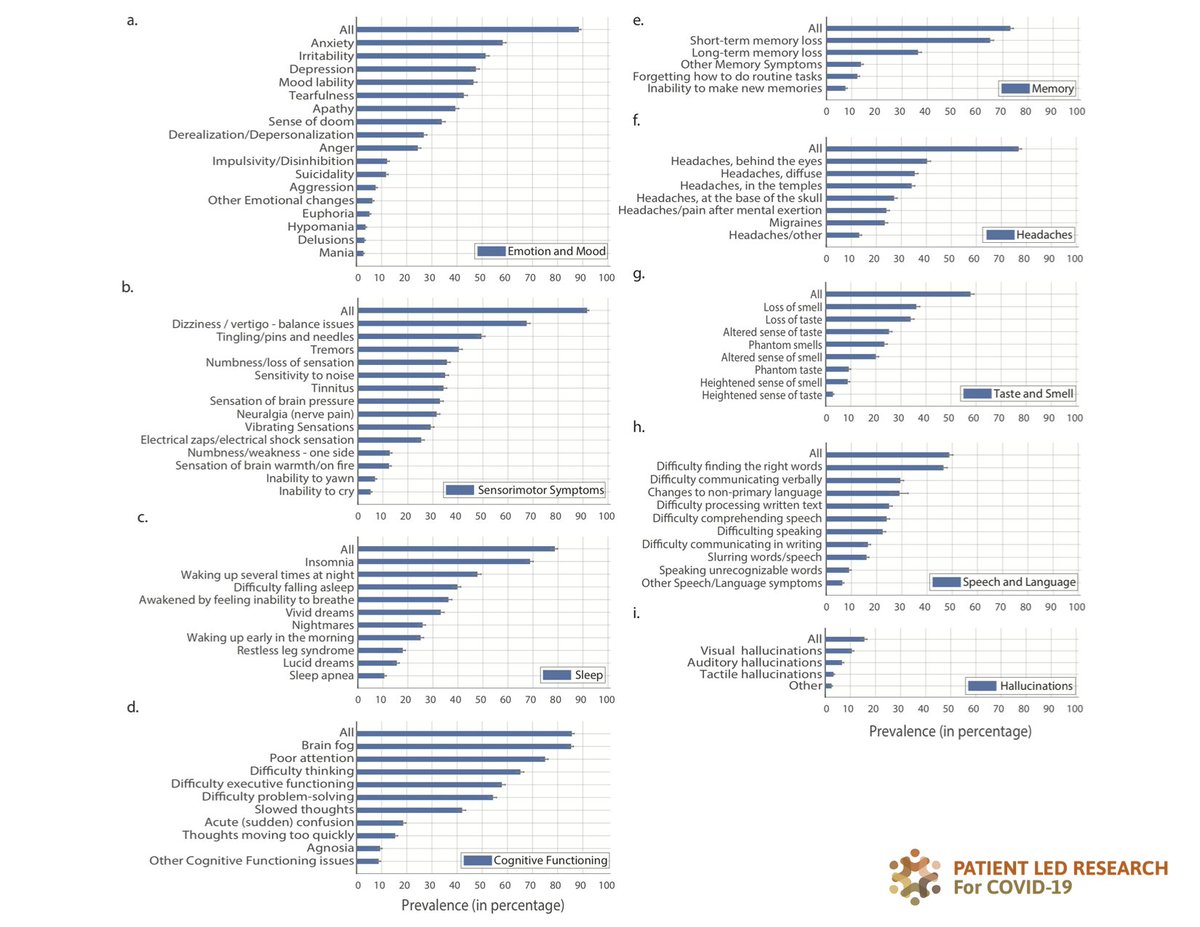
Our last survey found "brain fog" was common, but what is brain fog (referred to as cognitive dysfunction here) more concretely?
We found this to mean:
1. Poor attention/concentration (75% of respondents)
2. Difficulty thinking (70%)
3. Difficulty with executive...
7/
We found this to mean:
1. Poor attention/concentration (75% of respondents)
2. Difficulty thinking (70%)
3. Difficulty with executive...
7/
3. ...functioning (planning, organizing,
figuring out the sequence of actions, abstracting) (58%)
4. Difficulty problem solving/decision making (54%)
5. Slowed thoughts (49%)
These still don't capture the full impact of how disorienting it is, so read these quotes! #LongCovid 8/
figuring out the sequence of actions, abstracting) (58%)
4. Difficulty problem solving/decision making (54%)
5. Slowed thoughts (49%)
These still don't capture the full impact of how disorienting it is, so read these quotes! #LongCovid 8/
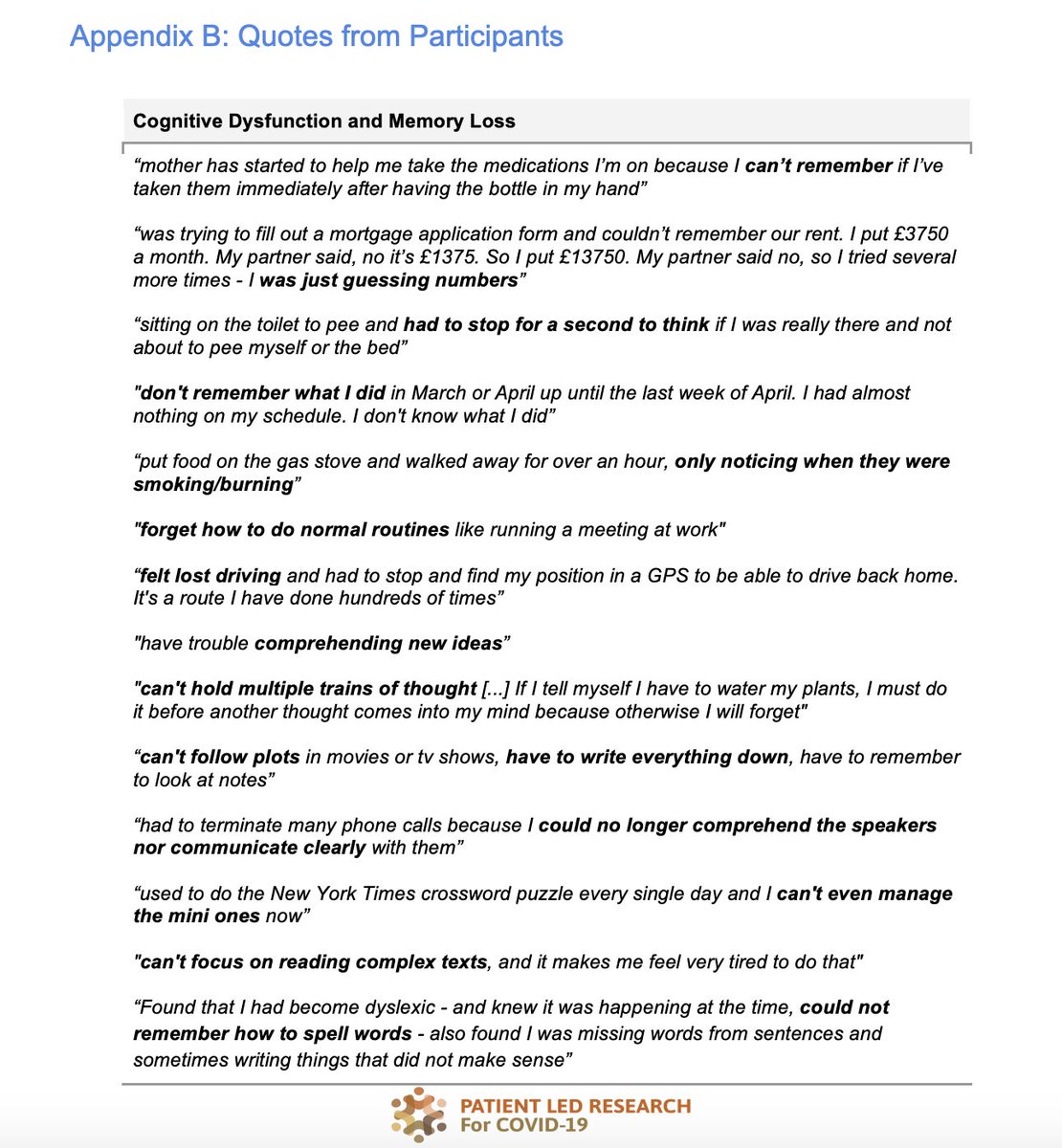
We asked about the impact of this cognitive dysfunction and memory loss of everyday life.
The greatest area affected was work (86%), with 29% responding this impact was 'severe'. Other high areas included making serious decisions, communicating thoughts/needs, 9/
The greatest area affected was work (86%), with 29% responding this impact was 'severe'. Other high areas included making serious decisions, communicating thoughts/needs, 9/
difficulty having conversations, maintaining medication schedules, following simple instructions, and driving. #LongCovid
Memory issues were also high: 73% were affected overall. The most common was short-term memory loss, at 65%.
10/
Memory issues were also high: 73% were affected overall. The most common was short-term memory loss, at 65%.
10/
One of the biggest findings to me was that there was no difference on age for the cognitive dysfunction, memory loss, or impact of these on daily life!! These happened as often in the 18-29 year old group as the 70+ group. #LongCovid #longhaulers
11/
11/
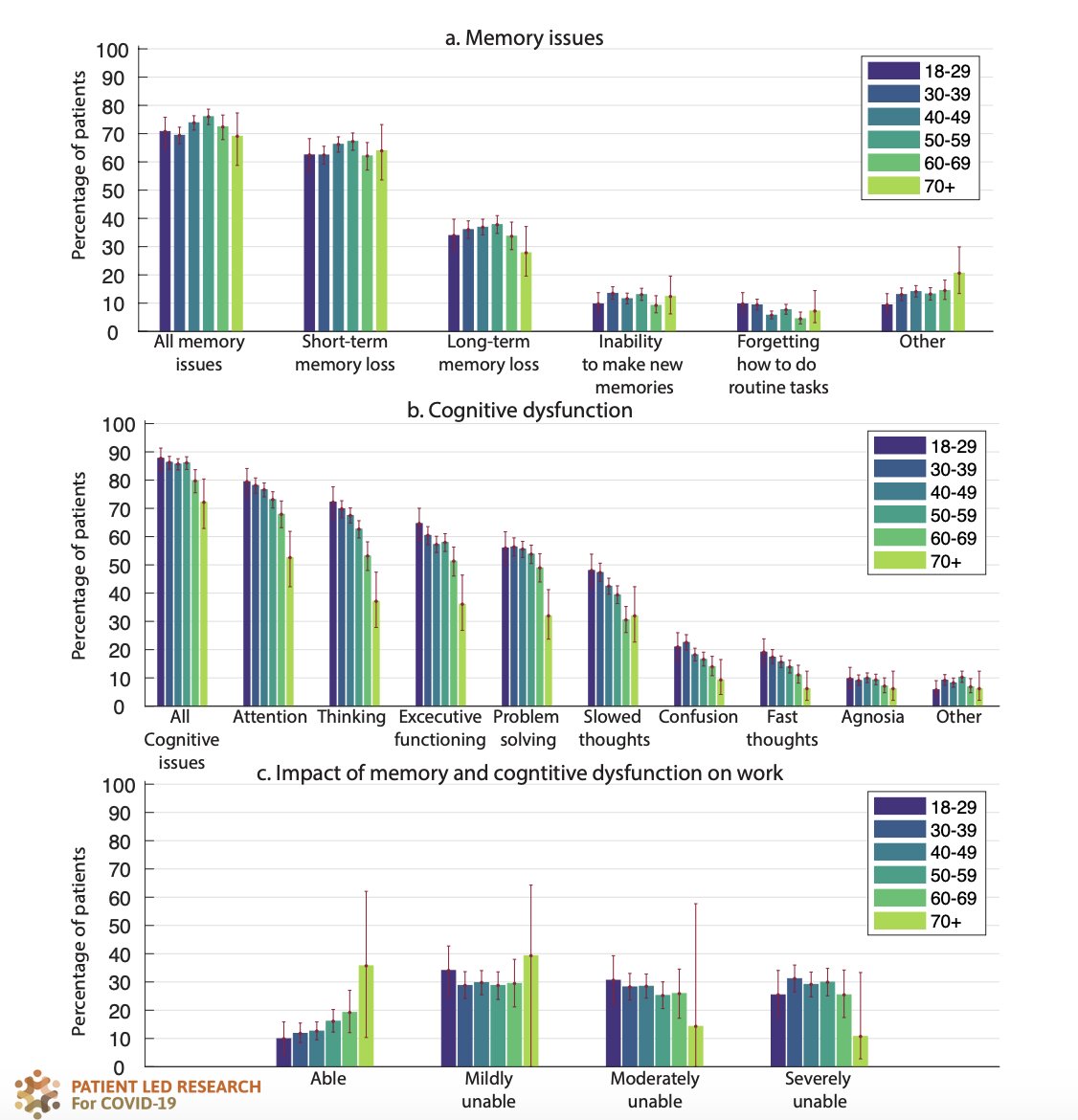
There were high prevalences of fatigue (98%) and post-exertional malaise (worsening of symptoms after activity) at (89%). These went down over time, but ~73% of respondents in month 7 reported having post-exertional malaise. Charts a-c describe PEM/PENE severity/delay #pwme
12/
12/

Cognitive dysfunction, fatigue, & post-exertional malaise are the 1) most common symptoms overall, 2) three most debilitating symptoms reported by patients, & 3) most common persisting symptoms after 6 months (followed closely by sensorimotor & headaches). #LongCovid
13/
13/
Relapses happened to >86% of #LongCovid respondents. Physical activity & stress were the most common triggers, followed by exercise & mental activity.
Chart e describes relapses as well as symptom timecourses. ~50% said their symptoms got gradually better. 14/
Chart e describes relapses as well as symptom timecourses. ~50% said their symptoms got gradually better. 14/
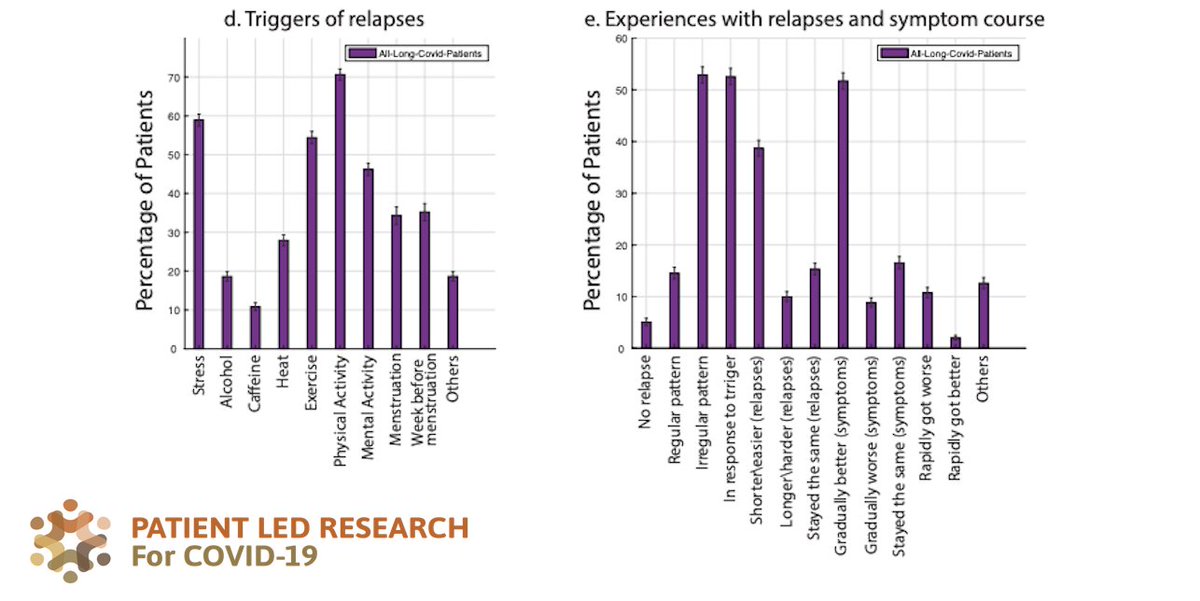
This paper includes many lesser known symptoms - even if infrequent, I want to highlight a few of them (Remember, with 80.5 million cases worldwide, & 10% of those (low estimate) with #LongCovid, that's 8 million people. A symptom prevalence of 1% is 800,000 people affected!) 15/
Some serious symptoms are happening in #LongCovid: vision loss (1%), hearing loss (9%), new anaphalaxis (4%), new allergies (9%), facial paralysis (3%), suicidality (12%).
20% of respondents have changes in sensitivity to medications!! All doctors need to be aware of these. 16/
20% of respondents have changes in sensitivity to medications!! All doctors need to be aware of these. 16/
On reproductive health in #LongCovid - I won't repeat everything but a few new datapoints:
15% of men reported sexual dysfunction. 11% of cis men and 3% of nonbinary respondents reported pain in testicles. 3% of cis men reported a decrease in genital size. 17/
15% of men reported sexual dysfunction. 11% of cis men and 3% of nonbinary respondents reported pain in testicles. 3% of cis men reported a decrease in genital size. 17/
Post-menopausal bleeding/spotting happened to 4.5% of cis women over age 49. Early menopause happened to 3% of cis women in their 40s. #LongCovid
26% of people with periods had abnormal periods; 20% had abnormally heavy periods/clotting. 18/
26% of people with periods had abnormal periods; 20% had abnormally heavy periods/clotting. 18/
The impact of Long COVID is substantial.
68% either required a reduced work schedule or were no longer working due to #LongCovid.
For those with symptoms beyond 6 months, they continued to experience an average of 14 symptoms in month 7! 19/
68% either required a reduced work schedule or were no longer working due to #LongCovid.
For those with symptoms beyond 6 months, they continued to experience an average of 14 symptoms in month 7! 19/
A key point - like last time, we accepted all suspected (positive, negative, and untested) #LongCovid patients, and compared the symptoms. Of 203 symptoms, 205 were statistically the same when comparing positive (orange in the chart here) & negative. The only difference
20/
20/
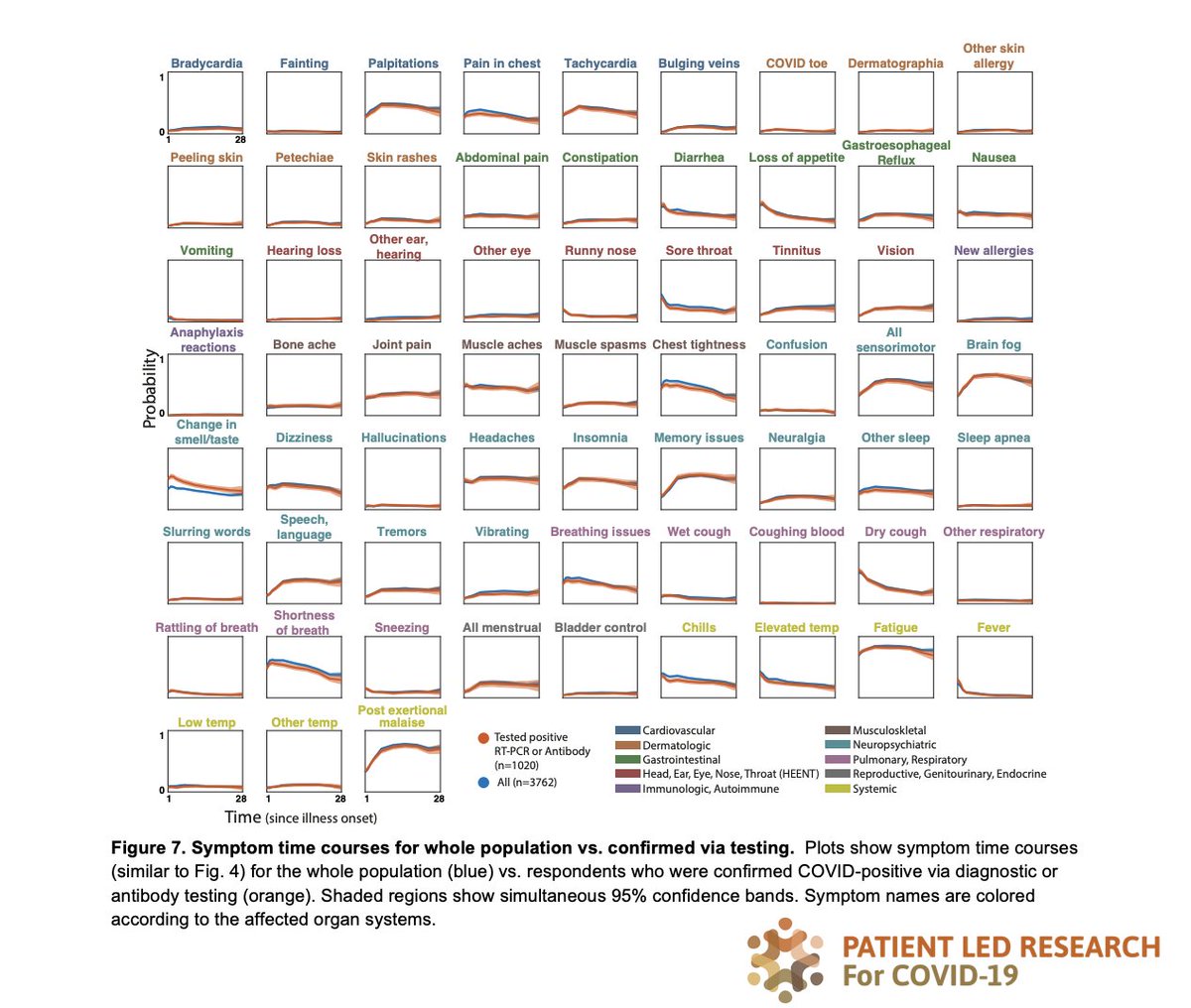
was loss of smell & taste, though altered smell/taste, heightened smell/taste, & phantom smell/tastes were all the same between positive & negative.
I think the loss of smell/taste may be bc: 1) Our dataset is mostly March or earlier, which was before smell/taste were known 21/
I think the loss of smell/taste may be bc: 1) Our dataset is mostly March or earlier, which was before smell/taste were known 21/
2) there may be a testing bias for later months (if you had loss of smell/taste, you were more likely to get tested and therefore test positive) 3) it's also totally possible that in the negative cohort, the virus doesn't stay in the throat as long, for some reason #LongCovid 22/
Importantly, the positive cohort was tested at a median of Day 6, and the negative cohort on Day 43 (!!!!) Whenever you hear 'negative test', especially for the spring wave, you should associated that with later or no testing availability. 23/
We didn't write too much about treatments in this paper, but we did include "pacing", which stood out with the highest % considering it "significantly helpful" (23%) or "slightly helpful" (19%).
(For an understanding of pacing, check out meaction.net/stoprestpace/)
24/
(For an understanding of pacing, check out meaction.net/stoprestpace/)
24/
I could write about insights forever but I'll end there for now. Future papers will include antibody & diagnostic testing, mental health, symptom clustering, socioeconomic impact, & more. Please reach out to us at @patientled with any questions or collaborations! #LongCovid 25/
We especially welcome BIPOC #LongCovid researchers who want to work with this data, & we plan to continue distributing this survey to #BIPOC communities. Please reach out if you'd like to collaborate! 26/
This was only possible due to the most amazing team ever (all #LongCovid patients): @GinaAssaf @LisaAMcCorkell @herlifeinpixels & @AthenaAkrami (who got us IRB sponsorship at @ucl!) Forever grateful to @itsbodypolitic (our home!), to @long_covid, #pwme, & so many others! 27/
We've been working on this for 7 months, immediately after we published our first #LongCovid survey in May, with every spare ounce of energy we have.
If you're able, please consider donating: gofund.me/f1acbf08
28/
If you're able, please consider donating: gofund.me/f1acbf08
28/
I should mention this was in a mostly non-hospitalized cohort (91.6% were not hospitalized). #LongCovid
29/
29/
• • •
Missing some Tweet in this thread? You can try to
force a refresh


